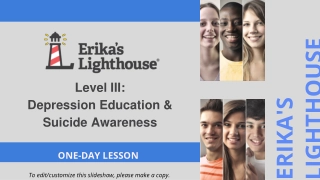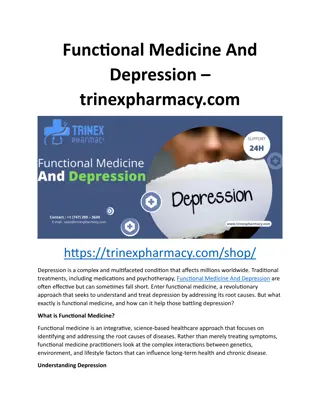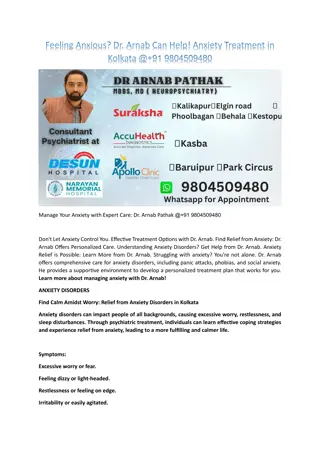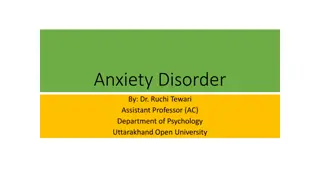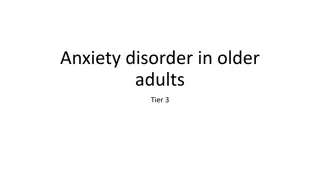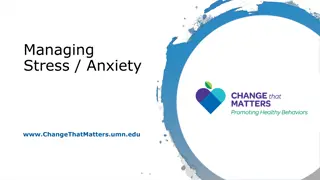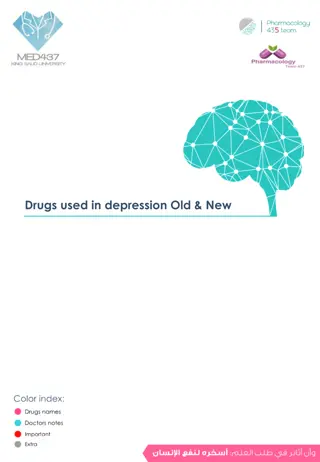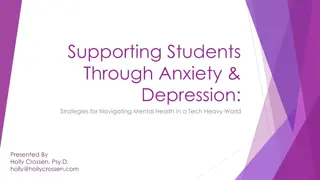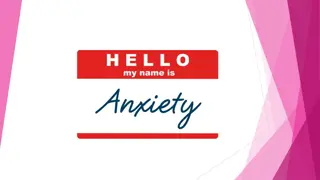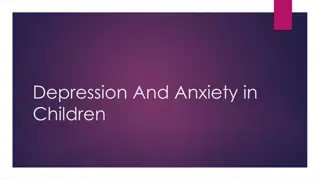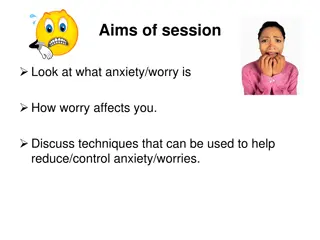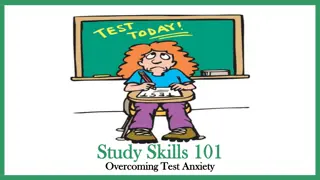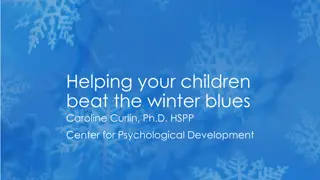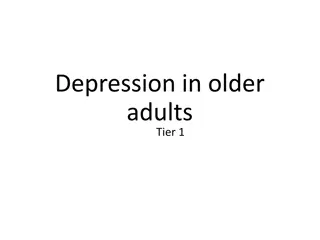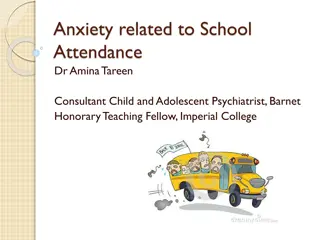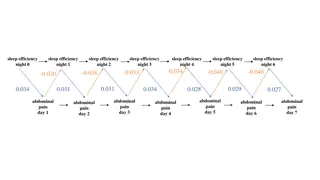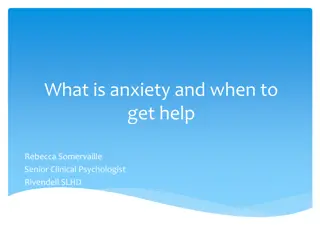Understanding Anxiety and Depression in Children and Teens
This presentation by Journey Counseling Services delves into identifying signs and symptoms of anxiety and depression in children and teens. Topics include the different components of anxiety, common signs and symptoms, and various types of anxieties such as phobias, separation anxiety, generalized anxiety disorder, panic attacks, obsessive-compulsive disorder, and post-traumatic stress disorder. Through this insightful discussion, the audience gains a deeper understanding of these mental health challenges in young individuals.
Download Presentation

Please find below an Image/Link to download the presentation.
The content on the website is provided AS IS for your information and personal use only. It may not be sold, licensed, or shared on other websites without obtaining consent from the author. Download presentation by click this link. If you encounter any issues during the download, it is possible that the publisher has removed the file from their server.
E N D
Presentation Transcript
Anxiety and Depression in Children and Teens: Identifying the Signs and Symptoms Presented by Journey Counseling Services Holly Smigel, LMHC, Owner and Clinical Director Kim Rees, LMHC, Full-time Counselor and TBRI Practitioner
Introducing Ourselves! Holly Kim Started JCS 12 years ago out of a desire and calling from God to practice counseling from a Christian perspective Joined JCS in 2012 after conversations with Holly and a desire to merge my faith along with counseling. Attended both undergrad and Graduate School at the University of Iowa. I have my Master's in Mental Health Counseling and licensed to practice in Iowa. I was recently trained to practice EMDR which is used to address trauma in adults and children. Attended the University of Iowa for undergrad and University of Northern Iowa for grad school. I am a Licensed Mental Health Counselor and a TBRI practitioner since 2018. Married to Tim for 20 years, we have 3 kids- Aleah 16, Micah 13 and Ellah 6. Married to David for 25 years, we have 3 kids Hannah 21, Emma 17 and Seth 13. We also live in North Liberty and are members at Grace Community Church serving in multiple areas. We live in North Liberty and are members at Grace Community Church where I serve on the worship team.
Anxiety has biological/chemical, emotional and spiritual components Anxiety is the mind and body's reaction to stressful, dangerous, or unfamiliar situations. It's the sense of uneasiness, distress, or dread you feel before a significant event. A certain level of Anxiety helps us stay alert and aware, but for those suffering from an anxiety disorder, it feels far from normal - it can be completely debilitating. What is Anxiety? Is there a difference between Anxiety and Worry? Is it a sin to be anxious?
Common Signs and Symptoms of Anxiety Constant and persistent worry Edginess, nervous or jumpy Reluctance or refusal to go to school or other activities Agitation Restlessness Inattention, poor focus Somatic symptoms like headaches or stomachaches Avoidance Tantrums Crying Meltdowns before school about clothing, hair, shoes, socks or after school about homework Difficulties with transitions within school, and between school and an activity/sport Difficulty settling down for bed Having high expectations for school work, homework and sports performance
Different types of Anxieties PHOBIAS: WHEN FEARS ARE OUT OF CONTROL SEPARATION ANXIETY: FEAR OF BEING AWAY FROM FAMILY GROWN-UPS GENERALIZED ANXIETY DISORDER: CONSTANT WORRYING FOR MONTHS AT A TIME PANIC ATTACKS: FEAR THAT STOPS YOU IN YOUR TRACKS OBSESSIVE-COMPULSIVE DISORDER: THOUGHTS AND ACTIONS YOU JUST CAN'T STOP POST-TRAUMATIC STRESS DISORDER: STRESS AND FEAR FROM A TERRIBLE MEMORY
Medical definition- Childhood depression is persistent sadness. When it occurs, the child feels alone, hopeless, helpless, and worthless. When this type of sadness is unending, it disrupts every part of the child's life. www.webmd.com/depression/childhood-depression What is Depression? Red Flags can include: child/teen acting out, isolating and no longer wanting to do the things they have enjoyed in the past, self-harming behaviors or comments about not wanting to live What to do about self-harm and/or suicidal thoughts ALWAYS take this information seriously. Reach out to a professional for help, support and resources.
Common signs/symptoms of Depression The signs and symptoms of childhood depression include: Changes in appetite -- either increased appetite or decreased Changes in sleep -- sleeplessness or excessive sleep Continuous feelings of sadness or hopelessness Difficulty concentrating Fatigue and low energy Feelings of worthlessness or guilt Impaired thinking or concentration Increased sensitivity to rejection Irritability or anger Physical complaints (such as stomachaches or headaches) that do not respond to treatment Reduced ability to function during events and activities at home or with friends, in school or during extracurricular activities, or when involved with hobbies or other interests Social withdrawal Thoughts of death or suicide Vocal outbursts or crying https://www.webmd.com/depression/childhood-depression#1
Are you noticing different patterns in behavior? Changes in eating/sleeping patterns. Withdrawing/isolating Reports of changed behavior by teachers, child care providers, friends and family Is your child/teen withdrawing and not willing to talk to you? Does your child/teen share that he or she is sad, lonely and/or worried? Have there been significant life changes or losses (moving, friendship loss, illness or injury, divorce or separation, death of a friend or family member) Has your child/teen been the victim of bullying? How Do I Know if my Child or Teen Needs Help?
Counseling specific approaches including Play therapy, TBRI, CBT, EMDR Treatment for Anxiety and Depression in Children and Teens Relaxation training Medication/Supplements/Vitamins Psychological assessment/testing for specific disorders such as ADHD What is the difference between a Psychiatrist, Psychologist, Counselor?
Recommended Resources What to Do When You're Scared & Worried by James J. Crist Freeing Your Child From Anxiety by Tamar Chansky You and Your Anxious Child by Anne Marie Albano The Anxiety Workbook for Kids by Robin Alter & Crystal Clarke What to Do When You Worry Too Much: A Kid's Guide to Overcoming Anxiety By Dawn Huebner Don't Let Your Emotions Run Your Life by Sheri Van Dijk What Do I Do When Teenagers are Depressed and Contemplate Suicide? By Steven Gerali
How to Get Started with Services at Journey Counseling To set up an appointment email Holly or Kim directly or call the office phone, 319-800-6299 holly@journeycounselingservices.net kim@journeycounselingservices.net To inquire about counseling with Mandy or interns please contact Holly Visit our website for specific information about our approach, our counselors and areas of specialty www.journeycounselingservices.net


